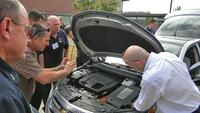-
Technology helps Jersey police fight crime in real-time
In the last decade massive technological breakthroughs have made information more accessible than ever before and law enforcement agencies are increasingly taking advantage of new mobile technology to help fight crime
-
-
Key to disaster preparedness is “training, training, training”

Bonnie S. Michelman, CPP/CHPA, the director of police, security, and outside services at Massachusetts General Hospital, recently took the time to speak with Homeland Security NewsWire’s executive editor Eugene K. Chow; in their interview, Michelman highlights the recent technological security measures Massachusetts General has installed, finding the right balance between security and openness, and preventing terrorists from stealing the low-grade radioactive materials that are housed in hospitals
-
-
Water rescues prove dangerous for first responders
Water rescues are particularly dangerous for first responders, and the recent attempt to rescue a man who jumped from a bridge over the Oswego River in New York last month proved to be no exception
-
-
Terrorists using sophisticated uni-directional bombs
Terrorists have learned to develop increasingly sophisticated explosives as evidenced by the uni-directional bombs detonated last week in Karachi, Pakistan that killed three Pakistan Rangers and injured several others
-
-
FBI opens new forensics lab for local law agencies in New Mexico
Thanks to a sophisticated new FBI forensics laboratory at the University of New Mexico in Albuquerque, local police now have access to cutting edge technology that can help streamline investigations
-
-
Special kits help protect police K-9s
To help keep police canines safe while on duty, the Police & Working K-9 Foundation has teamed up with private and public companies to hold “Cover Your K-9,” an innovative series of technology and training seminars
-
-
Grant helps Kentucky dive team operate without sight
Rescue and recovery divers often struggle to perform their duties in murky, muddy waters, but thanks to a $21,000 grant from Kentucky’s Homeland Security department, the city of Grayson was able to purchase a side-scan sonar and an underwater metal detector to help rescue divers complete their mission in low visibility conditions
-
-
Research may yield more compact antennas for military use
Researchers say that the tall, bulky antennas the U.S. military uses could be scrapped for low-profile, broadband antennas — thanks to a different approach to antenna design that replaces large dipole antennas with a more compact and conformal multi-mode radiator
-
-
New material increases weapons' explosive force
A new material, called High-Density Reactive Material (HDRM), is designed to replace steel in warhead casings with little or no compromise in strength or design
-
-
New sensor system tracks, locate firefighters where GPS fails
With support from the National Science Foundation, electrical engineers are developing a portable device called the Sentrix Tracking Unit; it straps on like a belt and consists of a suite of sensors; the sensors help locates missing firefighters— saving time and maybe lives
-
-
First responders learn how to deal with electric cars

With the growing number of electric vehicles on the road, first responders are now faced with a new type of vehicle that they know little about, which could be potentially dangerous in the event of a fatal crash; to help emergency responders learn about the new technology on the road today, Tesla, a manufacturer of electric vehicles, recently held a training seminar at one of its locations in California
-
-
Research centre to combat devastating effects of roadside bombs

Gaining a better understanding of the injuries caused by roadside bombs and improving both treatment and the means of protection are key aims of a new £8 million research center launched the other day; designing “intelligent” combat boots to deflect the impact of a roadside bomb and diagnosing damage more quickly in the injured to reduce future medical problems are two potential benefits
-
-
Disaster evacuation plans need to incorporate family perspectives
A recent study sponsored by the National Science Foundation found that most respondents felt the evacuation of New Orleans residents to the Superdome after Hurricane Katrina was a “failure” and this opinion has shaped their willingness to accept shelter if offered in an emergency evacuation
-
-
Why law enforcement officers should earn a degree in homeland security
In a guest column, Dennis Porter, a former law enforcement officer with more than thirty years of experience, argues that it is critical for U.S. national security that members of the law enforcement community return to school to obtain degrees in homeland security; with counterterrorism becoming an increasingly more crucial duty for law enforcement officers, it is imperative that they have the skills and knowledge to effectively combat extremism
-
-
Emergency response for the disabled

Roughly 56 million Americans have a disability and with many living without a telephone or television, communicating with them in the event of a major disaster is no easy task; to address the needs of disabled Americans during natural and manmade disasters, emergency officials recently participated in a seminar called “Planning for the Whole Community”
-
More headlines
The long view
AI-Controlled Fighter Jets May Be Closer Than We Think — and Would Change the Face of Warfare
Could we be on the verge of an era where fighter jets take flight without pilots – and are controlled by artificial intelligence (AI)? US R Adm Michael Donnelly recently said that an upcoming combat jet could be the navy’s last one with a pilot in the cockpit.
What We’ve Learned from Survivors of the Atomic Bombs
Q&A with Dr. Preetha Rajaraman, New Vice Chair for the Radiation Effects Research Foundation in Hiroshima and Nagasaki, Japan.
Need for National Information Clearinghouse for Cybercrime Data, Categorization of Cybercrimes: Report
There is an acute need for the U.S. to address its lack of overall governance and coordination of cybercrime statistics. A new report recommends that relevant federal agencies create or designate a national information clearinghouse to draw information from multiple sources of cybercrime data and establish connections to assist in criminal investigations.
Autonomous Weapon Systems: No Human-in-the-Loop Required, and Other Myths Dispelled
“The United States has a strong policy on autonomy in weapon systems that simultaneously enables their development and deployment and ensures they could be used in an effective manner, meaning the systems work as intended, with the same minimal risk of accidents or errors that all weapon systems have,” Michael Horowitz writes.
Twenty-One Things That Are True in Los Angeles
To understand the dangers inherent in deploying the California National Guard – over the strenuous objections of the California governor – and active-duty Marines to deal with anti-ICE protesters, we should remind ourselves of a few elementary truths, writes Benjamin Wittes. Among these truths: “Not all lawful exercises of authority are wise, prudent, or smart”; “Not all crimes require a federal response”; “Avoiding tragic and unnecessary confrontations is generally desirable”; and “It is thus unwise, imprudent, and stupid to take actions for performative reasons that one might reasonably anticipate would increase the risks of such confrontations.”
Luigi Mangione and the Making of a ‘Terrorist’
Discretion is crucial to the American tradition of criminal law, Jacob Ware and Ania Zolyniak write, noting that “lawmakers enact broader statutes to empower prosecutors to pursue justice while entrusting that they will stay within the confines of their authority and screen out the inevitable “absurd” cases that may arise.” Discretion is also vital to maintaining the legitimacy of the legal system. In the prosecution’s case against Luigi Mangione, they charge, “That discretion was abused.”
